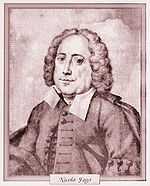Nicola Fago
From Wikipedia, the free encyclopedia

Nicola Fago.
Francesco Nicola Fago, 'II Tarantino' (26 February 1677 – 18 February 1745) was an Italian Baroque composer and teacher. He was the father of Lorenzo Fago (1704-1793). [1]
Biography
Born in Taranto, he studied music under Francesco Provenzale at the Conservatorio della Pietà dei Turchini in Naples between 1693 and 1695. Between 1704 and 1708 he worked at the Conservatorio Sant'Onofrio, but from 1705 to 1740 he was based at the Conservatorio della Pietà dei Turchini, where his pupils included Leonardo Leo, Francesco Feo, Giuseppe de Majo, Niccolo Jommelli, Nicola Sala, Michele de Falco, Carmine Giordani as well as his own son Lorenzo Fago. From 1709 to 1731 he also served at the Tesoro di San Gennaro. He died in Naples in 1745.
Operas
- Lo Masiello
- L'Astratto (1709)
- Il Radamista (1707)
- La Dafne
- Cassandra Indovina (1711)
- "Magnificat" ten vocals + instruments
- "Stabat Mater" 4 vocals + a quartet
- Il Faraone Sommerso (1709)
Other works
- Le fenzejune abbendurate, Commedia per musica, 1710
- La Cianna, Commedia per musica, 1711
- Lo Masillo Dramma per musica (second act by Michele de Falco), 1712
- La Dafne, Favola pastorale in stile arcadio, 1714
References
- ↑ Companion to baroque music Julie Anne Sadie - 1991 "Fago. Neapolitan father and son who were composers and teachers. Francesco Nicola Fago (1677- 1745), known as 'II Tarantino', studied with Provenzale at the Neapolitan Conservatorio S Maria della Pieta dei Turchini, where he himself ...Francesco Nicola's first post was as primo maestro of the Conservatorio di S Onofrio (1704-8), but from 1705 he was based at the Turchini where his pupils included Falco, Feo, Majo, Leo and Jommelli, as well as his own son Lorenzo.
|
This article is issued from Wikipedia. The text is available under the Creative Commons Attribution/Share Alike; additional terms may apply for the media files.